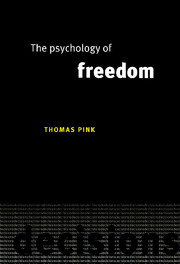Book contents
- Frontmatter
- Contents
- Acknowledgments
- Introduction
- 1 Agency and the will
- 2 Scepticism about second-order agency
- 3 Decision-making and freedom
- 4 The Psychologising conception of freedom
- 5 Decision rationality and action rationality
- 6 Decision-making and Teleology
- 7 The Regress argument
- 8 In defence of the Action model
- 9 The special-purpose agency of the will
- Conclusion
- Bibliography
- Index
7 - The Regress argument
Published online by Cambridge University Press: 31 August 2009
- Frontmatter
- Contents
- Acknowledgments
- Introduction
- 1 Agency and the will
- 2 Scepticism about second-order agency
- 3 Decision-making and freedom
- 4 The Psychologising conception of freedom
- 5 Decision rationality and action rationality
- 6 Decision-making and Teleology
- 7 The Regress argument
- 8 In defence of the Action model
- 9 The special-purpose agency of the will
- Conclusion
- Bibliography
- Index
Summary
INTRODUCTION
In this chapter and the next, we shall be addressing the sceptical arguments against a freedom and second-order agency of the will. This chapter will discuss and refute Hobbes' Regress argument. The next chapter will refute the argument from Non-Purposiveness and the Reduction argument.
The purpose of these two chapters, however, goes beyond refuting scepticism about second-order agency. The chapters will also serve to develop the case for the theory of decision rationality which I favour – a theory which by combining the Action model with REASON-APPLY, does justice not only to the agency of the will, but also to its executive, reason-applying function. This chapter is going to add to the case for REASON-APPLY by showing that the principle does work in explaining important and very intuitive limitations to the scope of the will. The next chapter is then going to be devoted to arguing for the Action model itself. Then, once scepticism about second-order agency has been disposed of by these two chapters, the book's final chapter can be devoted to establishing that, far from being in tension with one another, REASON-APPLY and the Action model of decision rationality are entirely consistent.
THE REGRESS ARGUMENT
Chapter 2 introduced Hobbes' Regress argument against freedom of will. Hobbes began by assuming that, in order to have freedom of action, one must have a capacity to act as one wills. He inferred that, therefore, in order to have freedom of will, one must have a capacity to will as one wills.
- Type
- Chapter
- Information
- The Psychology of Freedom , pp. 187 - 227Publisher: Cambridge University PressPrint publication year: 1996

